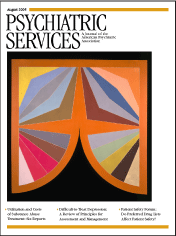The Peace of Mind Prescription: An Authoritative Guide to Finding the Most Effective Treatment for Anxiety and Depression
Hope is an antidote for depressive disorder; sound knowledge is a balm for anxiety disorders. This readable volume by experts Dennis S. Charney, M.D., and Charles B. Nemeroff, M.D., Ph.D., abounds with both hope and knowledge. As such, it is a readable text that is suitable for persons who suffer from these disorders as well as for those who care for them.
The authors, whose credentials are impeccable, suffuse their mission with several premises. First, anxiety and depressive disorders are epidemic in their proportions and are both destructive and corrosive in their impact. Second, treatment can be improved by appropriate, accurate diagnosis; by overcoming stigma; and through the pursuit of evidence-based therapies. Third, all patients can expect to improve or recover. This is a powerful beacon for sufferers and their loved ones.
The book includes a vital distinction between "adaptive" states of each disorder, which can promote and enhance survival and provide "temporarily valuable clarity of mind," and the formal disorders of depression and anxiety, which cause unnecessary suffering—physical, mental, and behavioral—in patients' lives. The authors give intelligent, thoughtful attention to a spectrum of pertinent topics: brain chemistry, impact on physical health, divorce guidance, psychotherapy, dysthymia (a surreptitious, less dramatic form of depression), pharmacologic treatments, and the ineffable issues related to human resilience. Many more related topics are addressed in this concise yet comprehensive volume.
It is difficult to identify shortcomings of this text. I perhaps would have liked to see the authors elaborate on a matter observed every day in clinical practice—namely, the ubiquitous self-medication attempts of anxious and depressed persons with food, alcohol, nicotine, marijuana, and perhaps compulsive shopping. Helping patients observe and manage these understandable but misguided attempts to seek relief from their pain would be eminently worthwhile.
Furthermore, the authors may be minimizing the probably pervasive anxiety and depression of our forbearer hunter-gatherers: "the pace of life was, literally, at a walk … contrast with the demands of the twenty-first century is so stark." In fact, the reader will finish this text with confidence that the authors—had they operated a clinic in the Stone Age—would have been as competent in the diagnosis and treatment of these painful conditions at that time as they are now.
Dr. Baird is a licensed clinical psychologist and board-certified psychiatrist at Central State Hospital in Petersburg, Virginia.



